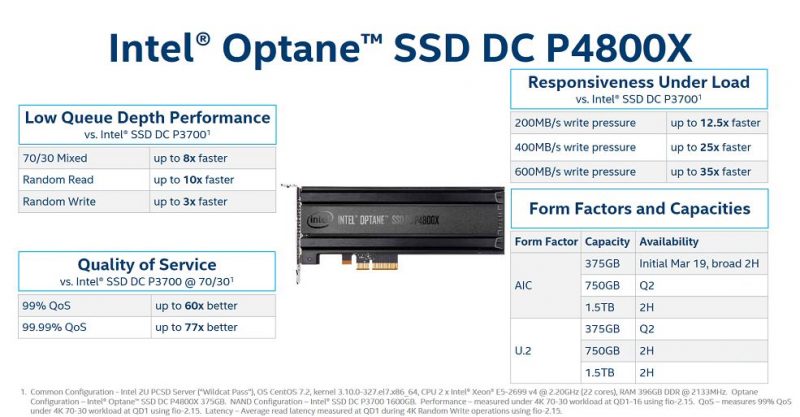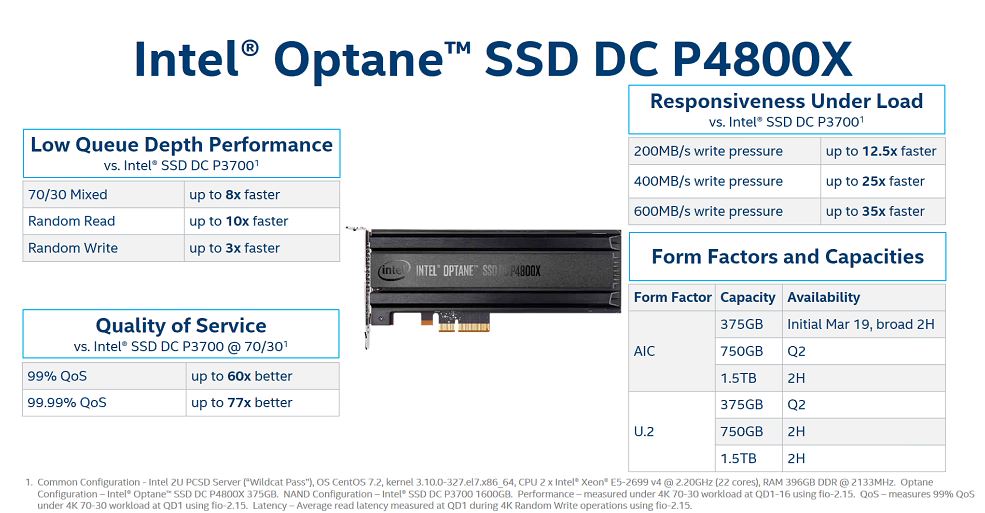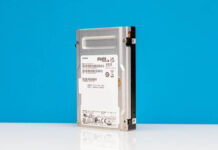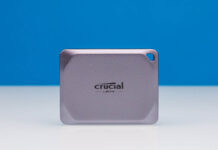We are going to start seeing a lot of these as Intel has shuttered its Optane business. The company announced this week that it is discontinuing the Intel Optane DC P4800X add-in cards (AIC) models.
Intel Optane DC P4800X AIC Discontinued
Last week we got the Intel PCN that says that these drives are going to be going away. It was interesting that these are a different PCN than the 2.5″ drives. Our sense is that the 2.5″ form factor is used by more OEMs so that may mean it has a longer lifespan. According to Intel, here are the products that are being discontinued:
|
Marketing Name |
Product Code |
Affected MM# |
|
Intel Optane SSD DC P4800X Series (375GB, 1/2 Height PCIe x4, 3D XPoint, 30DWPD) Generic 10 Pack |
SSDPED1K375GA10 |
953027 |
|
Intel Optane SSD DC P4800X Series (375GB, 1/2 Height PCIe x4, 3D XPoint, 30DWPD) Generic Single Pack |
SSDPED1K375GA01 |
953028 |
|
Intel Optane SSD DC P4800X Series (750GB, 1/2 Height PCIe x4, 3D XPoint™, 30DWPD) Generic 10 Pack |
SSDPED1K750GA10 |
956981 |
|
Intel Optane SSD DC P4800X Series (750GB, 1/2 Height PCIe x4, 3D XPoint, 30DWPD) Generic Single Pack |
SSDPED1K750GA01 |
956982 |
|
Intel® Optane SSD DC P4800X Series (1.5TB, 1/2 Height PCIe x4, 3D XPoint, 60DWPD) Generic 10 Pack |
SSDPED1K015TA10 |
956983 |
|
Intel Optane SSD DC P4800X Series (1.5TB, 1/2 Height PCIe x4, 3D XPoint, 60DWPD) Generic Single Pack |
SSDPED1K015TA01 |
956989 |
We have started to see the Intel Optane SSDs go on fire-sale prices recently. These drives may be the next to do so.

If you do want to order Intel Optane P4800X add-in cards from Intel, then the last day to do it is May 30, 2023. The last shipment date is September 30, 2023. That is still around a 4-year product run, and since Optane is being shuttered, that is a decent lifecycle for a SSD.
Final Words
Folks know that STH has used Optane for its databases for years. It is an absolutely fast solution for low queue depth reads/ writes. It is just not economical on a cost/ GB basis compared to modern NAND and Intel was unable to push it as far into the memory market, dooming the media. Still, even though these are PCIe Gen3 drives, they are very fast.
We just published an Optane PMem guide and will have a bunch more on the SSD side soon.





With Optane and Omnipath and all the other good but discontinued products, I don’t understand why Intel didn’t just reduce the price so they were competitive in the market. My suspicion is now that the high profit margins have disappeared from the CPU division, many of these other products would have had competitive earning rates even at reduced prices.
I picked up a 905p drive to play with. I’ve been using it for my games drives. It’s decently fast but compared to nvme NAND sticks it’s not worth the premium. For ~900gb I paid $340. For the same price I could have gotten nearly 4tb of NVME drive.
Sigh! When this was announced I really thought it would add to my bag of tricks as a “financial IT boiler technician” (Linux data center engineer / Linux system admin supporting a few thousand Xeon servers).
https://newsroom.intel.com/news-releases/intel-and-micron-produce-breakthrough-memory-technology/#gs.nznsk0
—–
I didn’t see Optane in-house until 2019 when a developer team working with Redis tried to use the Optane DIMM version via a Dell server Intel lent us for testing…It took a while for me to get things running given that we didn’t use Intel preferred Linux distribution…Answers to questions via Intel sources often had me waiting days for a response…When I did get things working at the systems end, the development team tried a couple of the usage method Optane memory provided, but even after going back & forth with Intel engineers, Optane DIMMs didn’t seem to provide a worthwhile boost or ROI…Said team had better luck augmenting Redis in-memory with fast NVMe SSDs (which also meant I would not be tied to specific servers in order to support their project. We were moving to EPYC-based servers around that time IIRC.)
Truly sad though, to see a breakthrough technology die so quickly.
https://redis.com/press/redis-labs-delivers-fastest-multi-model-database-intel-optane-dc-persistent-memory-3/
Shame that Intel has shuttered the Optane business just as CLX was arriving. This would have been a better fit in the market for the technology, especially if Intel wasn’t greedy and permitted its usage on any CLX.mem capable system.
@Kevin, I totally agree. I tend to assume that people working at Intel are much smarter than me, but sometimes one has to wonder.
@Alex, I wonder what’s left of these Samsung Z-NAND drives. SLC NAND, supposed to compete with Optane. I think this would’ve been a much more tried and true method to archieve greater performance, as you’re working within the established NAND ecosystem. Modern NVMe drives have these SLC portions too, so probably the speed difference between Optane and PCIe G4 NVMe isn’t that noticable at QD>=32.